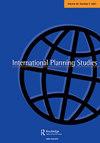政治与规划:伦巴第地区欧盟土壤战略与地方政策制定之间的土地取舍
IF 1.5
Q4 REGIONAL & URBAN PLANNING
引用次数: 0
摘要
虽然政党政府的民主理论主张负责任的决策者对政策产出的偏好的重要性,但后政治理论认为,在新自由主义取得胜利后,政治差异已经变得无关紧要。本文质疑政治是否会对土地使用政策产生任何影响,特别是在土地征用方面,重点关注意大利最大地区的地方民选官员(LEOs)的态度和选择,该地区于2014年引入了土地征用立法。大多数leo倾向于限制土地消耗,不扩大可开发土地。然而,这种态度似乎因leo的政治倾向而有所不同,在右翼管理者中不太常见。此外,正如土地消耗率所显示的那样,这与既定的支持发展的模式并不矛盾。通常,在特殊利益集团的影响下,地方土地利用决策可能破坏旨在实现可持续性的大规模战略,例如欧盟的土壤战略。本文章由计算机程序翻译,如有差异,请以英文原文为准。
Politics and planning: land take between the EU soil strategy and local policymaking in Lombardy
ABSTRACT While the democratic theory of party government contends the importance of accountable decisionmakers’ preferences for policy outputs, the post-politics thesis argues that political differences have become irrelevant after the triumph of neo-liberalism. This paper questions whether politics makes any difference in land-use policy, with specific regard to land take, focusing on attitudes and choices of local elected officers (LEOs) in Italy’s largest region, where legislation on the land take was introduced in 2014. Most LEOs favour limiting land consumption and do not expand developable land. However, such attitude appears to somehow vary according to LEOs’ political leanings, being less common for right-wing administrators. Furthermore, this does not contradict the established pro-development paradigm, as shown by land consumption rates. Typically, under the influence of special interests, local land-use decisions can undermine large-scale strategies aimed at sustainability, such as the European Union’s Soil Strategy.
求助全文
通过发布文献求助,成功后即可免费获取论文全文。
去求助
来源期刊

International Planning Studies
REGIONAL & URBAN PLANNING-
CiteScore
4.60
自引率
4.80%
发文量
20
期刊介绍:
Planning, at urban, regional, national and international levels, faces new challenges, notably those related to the growth of globalisation as both an objective socio-economic process and a shift in policy-maker perceptions and modes of analysis. International Planning Studies (IPS) addresses these issues by publishing quality research in a variety of specific fields and from a range of theoretical and normative perspectives, which helps improve understanding of the actual and potential role of planning and planners in this context.
 求助内容:
求助内容: 应助结果提醒方式:
应助结果提醒方式:


